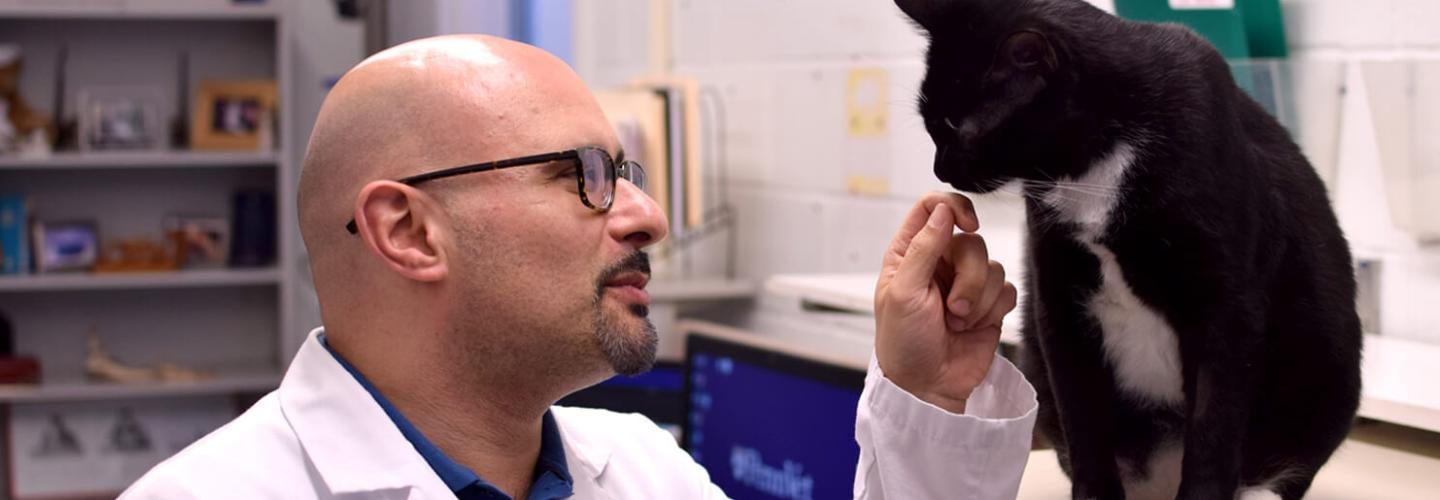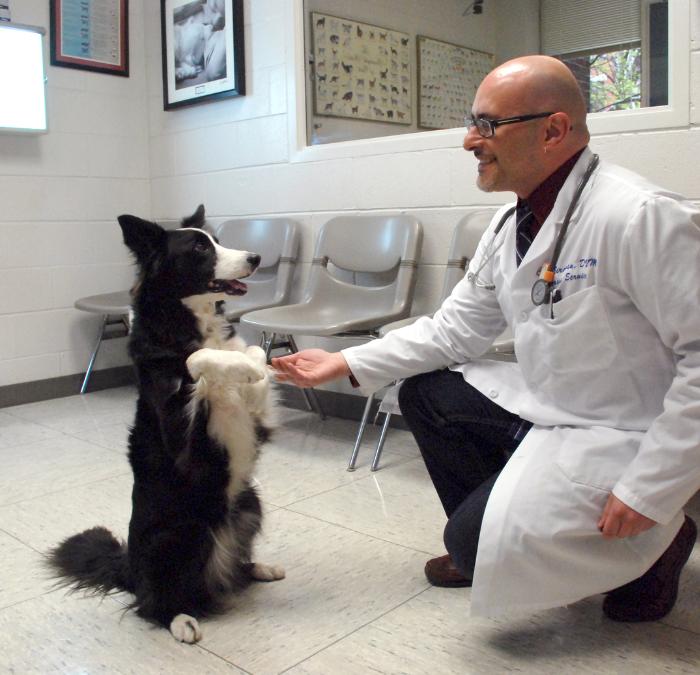
Behavior Medicine
What we do
Our clinical team members combine skills from behavioral and other branches of veterinary medicine to address your pet’s behavior needs. We use a rigorous scientific approach to understand the mechanisms behind animal actions, which allows us to deliver effective and welfare-friendly treatment. We primarily see cats and dogs of all ages and behavior problems including house-training, destructiveness, self-injurious activity, and aggression towards people or other animals.

Book an Appointment
Visits to the Behavior Clinic are by appointment only. Pet owners may be referred to us by their primary care veterinarians, or may contact us directly, without a referral.
Call: 215-746-8387
Questions: beclinic@vet.upenn.edu
What to expect
Our Services
The service finds ways to manage and improve your animal’s behavior. We see cats and dogs of all ages for behavior problems, including house-training and litter box problems, destructiveness, self-injurious activity, and aggression towards people or other animals.
Defining a Treatment Plan
After diagnosis, your care team will build a treatment plan, which may include:
- Safety counseling
- Behavior modification
- Management techniques such as modification of the home environment
- Medication (if needed)
We emphasize the safety of our patients and of everyone who interacts with them.
In the second half of the appointment you will work with a behavior technician on the behavior modification techniques recommended by the veterinarian. You will be provided a detailed written summary of the visit with all of the veterinarian’s recommendations and instructions for continuing behavior modification at home.
CALM Program
The Penn Vet CALM program allows veterinarians and veterinary professionals to learn, understand, and apply a variety of tools to enhance the welfare of animals. Penn Vet faculty and clinicians will discuss the biology behind the stress response; how to recognize fear, anxiety, and stress in veterinary patients; and how to effectively prevent and manage them in different contexts. Participants will discover ways to compassionately and respectfully address the veterinary needs of their patients.
The program is approved for CE credits. All participants will receive a certificate upon completion of the program. To participate and to learn more about the program, please email Maria Calabrese, CVT, director of Outreach at Ryan Hospital.
Our Care Team

Director of Animal Behavior Medicine
Carlo Siracusa, DVM, PhD, DACVB, DECAWBM
Professor of Clinical Small Animal Behavior and Welfare
Veterinarians, Residents, and Staff

Alexandra Cox, DVM

Anna Mukhina, DVM
Lydia Kring, CVT
Veterinary Technician
Understand your Pet
Resources for Clients & Patients
When you adopt a companion animal, dog or cat, from a shelter or a breeder, knowing some simple concepts will help you develop a good relationship with your new pet. Below are some resources you can use, either as stand-alone recommendations, or in conjunction with your visits to our service.
Also, the San Francisco Society for the Prevention of Cruelty to Animals (SFSPCA) has helpful tips about KONG Stuffing.
Have a plan
Penn Vet’s Training Tips for Dogs
Have a Plan That Is Practical and Pleasant
You may choose to train your dog yourself, go to classes or hire a trainer to come to your home. Trainers should use positive, non-forceful methods. Classes should be small, well-organized and held in an area without distractions. Training should be enjoyable for you and your dog.
Teach Life Skills
Behavior Medicine, Penn VetBasic training should focus on practical skills that make your dog a manageable and pleasant companion. “Sit” is useful to control jumping, “come” will bring your dog back to you, “stay” or “wait” will keep him from rushing into situations that could be hazardous and “look” will get his attention when you need it.
Reinforce Learning
Food treats are used to reinforce a behavior you want. They give you a way to get and keep his attention and make him an eager participant in training. Treats are given for each correct response while training a behavior, and less frequently once the behavior is well learned. Treats can be ordinary or exciting, depending on the difficulty of what you are teaching.
Train in Short Sessions
Training sessions are most effective when they are short—five minutes or less. Repeated short sessions working on a skill are most effective. Always try to end on a positive note, asking your dog to do something he already knows well.
Be Persistent and Enthusiastic
Persistence is the key to success — don’t give up after a short time. Continue to work on the things you want your dog to learn with enthusiasm and food treats. Over time you’ll accomplish your training goals.
Teach One Stage at a Time
Begin training a behavior in a setting with no distractions. When your dog is very reliable in that setting, move to settings with more distractions — for example, from a living room to a deck to a yard to a park or neighborhood. Each move will require review — starting slowly and clearly with very desirable food treats in the new setting.
Know Your Dog’s Limits
Don’t try to use any training cue such as “sit” or “come” in a real-life situation until the dog is nearly perfect with it in practice sessions. If you ask for a behavior a dog is unlikely to be able to perform, you risk making the cue word meaningless or confusing. This takes patience, but it’s important.
Use Your Best Tool — Your Voice
It isn’t necessary to touch a dog to train a dog. Good trainers and good books and DVDs can show you how to train “hands free.”
Assess Your Progress
If your dog seems stubborn or is a slow learner, review both your training methods and the setting in which you are working. You may need a quieter area with no other people or animals present, better treats or help with your own skills.
Know When to Call the Experts
Dogs don’t know when they have done something wrong. They do know when you are upset or angry, though, and will get upset themselves. This will make training difficult and unpleasant for both of you. The Behavior Service at Ryan Veterinary Hospital can help if you encounter serious problems in training your dog. Please leave us a message at (215) 898-3679 or email beclinic@vet.upenn.edu.
Research
Our research is focused on clinical behavior problems and their relationship with medical problems, as well as low-stress handling of patients during veterinary visits.
Influence of environmental background and behavior in clinics on diagnosis and treatment outcomes in canine behavioral medicine cases
The goal of this project is to identify factors related to dogs, their owners, and the environment in which they live that may provide the clinician with information about the potential outcome of a behavior case. In a preliminary study we found that some characteristics of a dog, his owner, or the environment in which they live increase the risk that the patient may be re-homed or euthanized. Read more about this project.
Cognitive Studies in dogs Affected with Mucopolysaccharidosis Type I (MPS I)
The study analyzes the change in behavior and cognition that dogs with MPS I, a disease that also affects humans, can experience. Find out more about the data collection for this project and how it was analyzed.
The Efficacy of Dexmedetomidine Oromucosal Gel to Decrease Stress in Dogs During Veterinary Visits
A third project is focused on the efficacy of dexmedetomidine oromucosal gel to decrease stress in dogs during veterinary visits. As all pet caregivers know, veterinary visits can be an important source of stress for our patients. We are studying the ability that a medication administered directly by the owner prior to the visit has in decreasing this stress.
Ryan Veterinary Hospital
Emergencies:
(215) 746-8911
By Appointment:
(215) 746-8387

